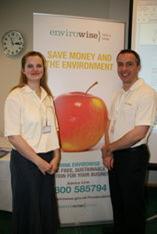

Sustainable business experts Envirowise and the Food and Drink Federation (FDF) pushed businesses to take action to reduce their use of water at this year’s Food and Environment Efficiency Day (FEED) on Tuesday.
Held at the East Midlands Conference Centre in Nottingham, the event provided free day of seminars and workshops and was organised by Envirowise, a government-funded enterprise that offers a free and confidential service for food and drink manufacturing businesses.
Speakers at the event included Sir Jeff Rooker, minister for sustainable food and farming and animal health for Defra, and David Bellamy, sustainability manager of the FDF. And the main topic on the agenda was the Federation House Commitment (FHC2020), which aims to reduce overall water usage across the food and drink industry by 20 per cent by 2020. Bellamy told delegates that any size of business can join the commitment, which was jointly developed by the FDF and Envirowise, and that action must be taken. It has been estimated that the food and drink industry’s water use could be reduced by 140 million litres a day - the equivalent to 56 Olympic-size swimming pools, he said.
Rooker maintained that FHC2020 had Defra’s full support. “The next generation will probably face water shortages before they run out of energy,” he said. “It is good to see that these changes are industry driven, but remember that 2020 is not that far away. The industry needs to act. But you will soon find that these schemes put in place will pay for themselves.”
FHC2020, which is part of FDF’s five-fold environmental ambitions, was set up in July 2007 and has already signed up 21 companies with a total turnover of £15 billion. The companies signed up to the scheme include Unilever UK, Premier Foods and Tate and Lyle.
Envirowise is offering to help fresh produce manufacturing businesses, such as prepared fruit and vegetable processors, reduce their water use. “The best process is to minimise the amount of water you use in the first place,” Stuart Ballinger, strategic manager at Envirowise said. “Treatment at the end of the pipe is discouraged. For a business preparing fresh produce, it should be looking at the amount of water used for washing the produce and putting some staff education in process, as well as identifying where the opportunities are to reduce water use.”